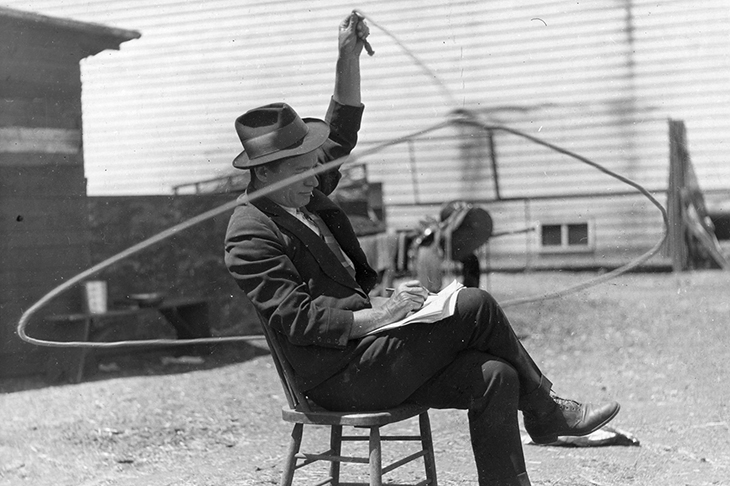There is racing elsewhere in the world. It restarted in France on Monday, la course de chevaux being classed in that fine country as an agricultural activity. My friend the form guru, who combs back six races in search of clues, has even cast his net to include somewhere called Morphettville in Australia where last week he succeeded in backing a 65-1 winner. When, over the phone, he sensed my raised eyebrow at a horse with truly believable form being allowed to start at such odds, he explained that the animal had won two previous races: ‘The horse wasn’t to know they were lower-class events. He still got the same boost to his confidence.’ Good point. No wonder that a household name with whom I used to play squash once told me pityingly: ‘The world, Robin, is divided into those who know how to make money and those who don’t. You, alas, are in the second category.’
The coronavirus lockdown has been my chance to prove to a questioning Mrs Oakley that I can live without racing. Or it would have been had we not agreed to cheer ourselves up by drinking better wines, and had the televised races on Sky Racing from American venues such as Tampa Bay Downs, Gulfstream Park and Will Rogers Downs not, thanks to the time difference, started in the early evening at about the time she serves — insisting on candlelight — her fresh tuna with olives and tomatoes or her plaice with brown shrimps and sauce vièrge. There is simply no contest. The table wins every time.
In the Sky Racing studio Jason Weaver and Matt Chapman do their always professional best to enliven the spectacle but watching pretty low-grade animals belt hell for leather round invariably left-handed and mostly ‘dirt’ tracks without a trace of individuality excites me about as much as watching a never-ending loop of GoCompare.com TV advertisements. The breathlessly monotonous commentaries never reflect on tactics and their execution or even mention a jockey by name.
A little unfair, I suppose. They have been racing in America since a course named after Newmarket opened up on Long Island in 1665 and by 1890 the USA had more than 300 courses. There are still more than 100 thoroughbred and harness tracks. The Triple Crown contest involving the Kentucky Derby at Churchill Downs, the Preakness Stakes in Maryland and the Belmont Stakes at its Long Island home has produced some magnificent horses. When the boy wonder Steve Cauthen was brought to Britain by Robert Sangster and Barry Hills, his clock-in-the-head judgment of pace forced the top British jockeys to reinvent their own game. But while I have raced in Australia, France and Hong Kong, I have sadly never made it to a Kentucky Derby and my mental images of American racing are the best part of a century out of date. That is down to the aforementioned Will Rogers and to Damon Runyon.
Rogers, the cowboy with a rope act, became a vaudeville star, a film actor and a corncob current-events commentator beloved of the American public. Part-Cherokee, he once said: ‘My ancestors didn’t come across to America on the Mayflower, but they met it.’ It was he who declared: ‘I am not a member of any organised political party. I am a Democrat.’ And his best line on the Sport of Kings was: ‘A difference of opinion is what makes horse racing and missionaries.’
I was a Runyon fan at an early age and one of the most serendipitous commissions I ever received was the invitation to write an introduction to a collection of his racing stories. As the inventor of Guys and Dolls, Runyon’s gift — and he can fairly be accused of both racism and sexism — was to make appealing a band of petty swindlers trying to ‘make a scratch’ to stake on winning ‘big potatoes’ and hopefully purchasing at last a wedding ring for the likes of Miss Cutie Singleton and Miss Beulah Beauregard ‘who act without thinking, as dolls often do, especially blonde dolls’. Who can forget tipsters like Hot Horse Herbie who ‘nearly always has a horse that is so hot it is fairly smoking, being a horse that cannot possibly lose a race unless it falls down dead, and while Herbie’s hot horses often lose without falling down dead, this does not keep Herbie from coming up with others just as hot’. Then there is the Seldom Seen Kid — so named ‘because he is seldom seen after anything that comes off that anybody may wish to see him about as he has a most retiring disposition’.
In the days when I combined this Turf column with being the BBC’s political editor, I tried not to satisfy Commons contacts who asked for tips. I could not afford to become the Seldom Seen Kid and so would try tactfully to divert them with Runyon’s line: ‘The race is not always to the swift, nor the battle to the strong; but that’s the way to bet.’






Comments